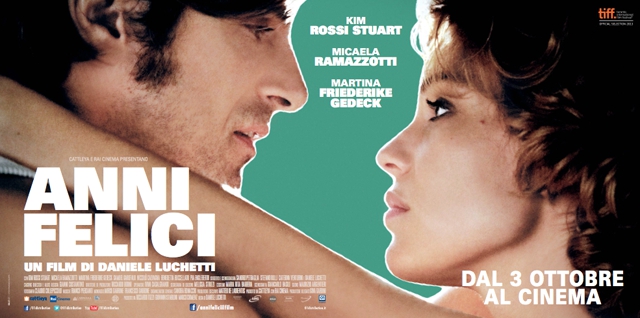
Anni Felici (Happy Years)—formerly known under the title Storia mitologica della mia famiglia—the new film by Daniele Luchetti will have its world premiere at the Toronto Film Festival (5-15 September 2013). The film, written by Sandro Petraglia, Stefano Rulli, Catherine Venturini and the same Luchetti, starring Kim Rossi Stuart and Micaela Ramazzotti, will be released on the 3 October. The cast also includes Martina Gedeck (The Lives of Others) and, for the first time on screen, the two young actors Samuel Garofalo and Nicholas Calvagna. Produced by Cattleya with Rai Cinema and co-produced by France’s Babe Films and distributed by 01 Distribution, Anni Felici was shot over the course of nine weeks in Rome, Follonica, Milan and Camargue (France).
Anni Felici is the most autobiographical of Lucchetti’s films (I piccoli maestri, Mio fratello è figlio unico, La nostra vita). The story, set in Rome in 1974, is that of Guido, played by Kim Rossi Stuart, an aspiring avant-garde artist who feels trapped in a family too bourgeois and contemporary for his taste. His wife Serena (Michaela Ramazzotti) does not love art, but she loves the artist, from whom she desires constant attention and accolades. Their children, Dario and Paul, respectively 10 and 5 years old, are involuntary witnesses of the irresistible erotic attraction between their parents, but also of their disasters, betrayals, and sentimental negotiations. The film narrates the Anni Felici–which appear unhappy–of a family that while trying to be more free, finds itself in a prison with no way escape. Will they manage to save themselves?
“This is a very personal film for me,” Luchetti says. “I started out from a distance with Mio fratello è figlio unico, telling the story someone else’s family, that of Antonio Plumes (based on the book Il fasciocomunista). I then told the story of a neighbor’s life with La nostra vita, until finally I realized that it was time to attempt to get closer to my own family, and to say for the first time ‘I’–obviously adopting forms of censorship, self-censorship, and shields.” And if the title of the film was Storia mitologica della mia famiglia it’s because, he explains, “it is a story in which everything is reinvented in order to try to tell the truth. Many facts are false, but the feelings are all authentic.”
